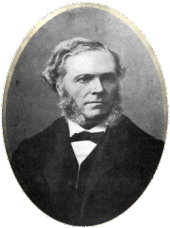César Franck was born in Liège, Belgium to a father from the German-Belgian border and a German mother. His father had ambitions for him to become a concert pianist, and he studied at the conservatoire in Liège before going to the Paris Conservatoire in 1837. Upon leaving in 1842 he briefly returned to Belgium, but went back to Paris in 1844 and remained there for the rest of his life. His decision to give up a career as a virtuoso led to strained relations with his father during this time.
During his first years in Paris, Franck made his living by teaching, both privately and institutionally. He also held various posts as organist: from 1847 to 1851 he was organist at Notre Dame de Lorette, and from 1851 to 1858 he was organist at St. Jean-St. Francois. During this time he became familiar with the work of the famous French organ builder Aristide Cavaillé-Coll, and he also worked on developing his technique as an organist and improviser.
In 1858, he became organist at the newly-consecrated Saint Clotilde Basilica, where he remained until his death. Here he began to attract attention for his skill as an improviser. His first set of organ compositions, however, was not published until 1868, when he was 46 years old, though it contains one of his finest organ pieces, the Grande Pièce Symphonique. From 1872 to his death he was Professor of Organ at the Paris Conservatory. His pupils included Vincent d'Indy, Ernest Chausson, Louis Vierne, and Henri Duparc. As an organist he was particularly noted for his skill in improvisation, and on the basis of merely twelve major organ works, Franck is by many considered the greatest composer of organ music after J. S. Bach. His works were some of the finest organ pieces to come from France in over a century, and laid the groundwork for the French symphonic organ style. In particular, his Grande Pièce Symphonique, a 25-minute work, paved the way for the organ symphonies of Charles-Marie Widor, Louis Vierne, and Marcel Dupré.
In 1890, Franck was involved in a serious traffic accident. It was after this accident that he wrote his Trois chorals for organ. Franck died as a result of complications from the accident very shortly after finishing the chorales. He was interred in the Cimetière du Montparnasse in Paris.
